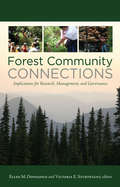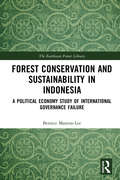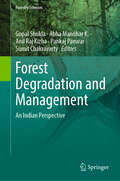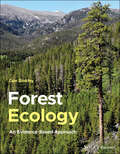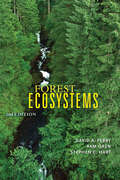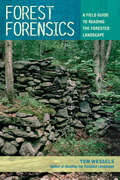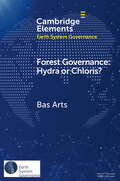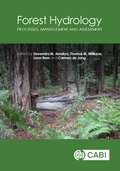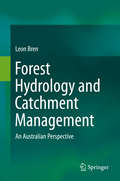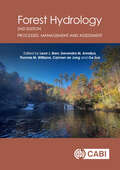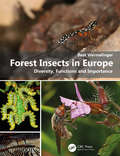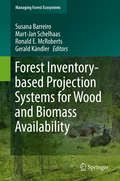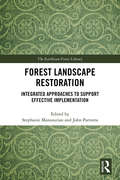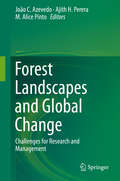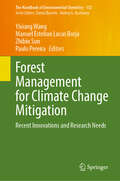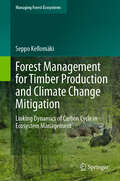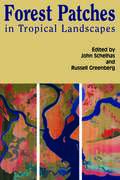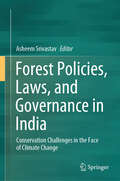- Table View
- List View
Forest Community Connections: "Implications for Research, Management, and Governance"
by Ellen M Donoghue Victoria E SturtevantThe connections between communities and forests are complex and evolving, presenting challenges to forest managers, researchers, and communities themselves. Dependency on timber extraction and timber-related industries is no longer a universal characteristic of the forest community. Remoteness is also a less common feature, as technology, workforce mobility, tourism, and 'amenity migrants' increasingly connect rural to urban places. Forest Community Connections explores the responses of forest communities to a changing economy, changing federal policy, and concerns about forest health from both within and outside forest communities. Focusing primarily on the United States, the book examines the ways that social scientists work with communities-their role in facilitating social learning, informing policy decisions, and contributing to community well being. Bringing perspectives from sociology, anthropology, political science, and forestry, the authors review a range of management issues, including wildfire risk, forest restoration, labor force capacity, and the growing demand for a growing variety of forest goods and services. They examine the increasingly diverse aesthetic and cultural values that forest residents attribute to forests, the factors that contribute to strong and resilient connections between communities and forests, and consider a range of governance structures to positively influence the well being of forest communities and forests, including collaboration and community-based forestry.
Forest Conservation and Sustainability in Indonesia: A Political Economy Study of International Governance Failure (The Earthscan Forest Library)
by Bernice Maxton-LeeDespite carefully constructed conservation interventions, deforestation in Indonesia is not being stopped. This book identifies why large-scale international forest conservation has failed to reduce deforestation in Indonesia and considers why key stakeholders have not responded as expected to these conservation interventions. The book maps the history of deforestation in Indonesia in the context of global political economy, exploring the relationship between international trade, the interests and ideology behind global sustainability programmes and the failures of forest conservation in Indonesia. Global economic and political ideologies are shown to have profoundly shaped deforestation. The author argues that the same forces continue to prevent positive outcomes. Case study chapters analyse three major international programmes: Reducing Emissions from Deforestation and Forest Degradation (REDD+), the Norway-Indonesia bilateral partnership, and the Roundtable on Sustainable Palm Oil (RSPO) in Indonesia. The findings provide insight into the failures of global climate change policy and suggest how the book’s theoretical model can be used to analyse other complex environmental problems. The book is a useful reference for students of environmental science and policy, political theory, international relations, development and economics. It will also be of interest to forestry professionals and practitioners working in NGOs.
Forest Degradation and Management: An Indian Perspective (Forestry Sciences #87)
by Gopal Shukla Sumit Chakravarty Pankaj Panwar Abha Manohar K. Anil Raj KizhaForest Degradation and Management - An Indian Perspective provides an overview of the dynamics and challenges surrounding forest degradation in India. It reveals the harmful impacts of human activity on natural resources, ecosystems, and communities, and emphasizes the urgent need for sustainable forest management practices. The book is divided into four parts, each offering a different perspective on forest degradation. Part I presents an overview of forest degradation in India, including a comparative analysis of assessment tools. Part II explores the ecological impacts of forest degradation on ecosystems. Part III is dedicated to societal aspects, examining the consequences of human activity such as cultivation, eco-tourism, resource utilization, and deforestation, while also analyzing the impact of forest degradation on forest-dependent communities. Part IV focuses on mitigation strategies, highlighting the role of protected areas, governance, policies, and participatory approaches. This volume within the book series Forestry Sciences is an invaluable resource for students, researchers, policymakers, and conservationists seeking to tackle the complex challenges of forest degradation. It provides knowledge and practical insights to inform decision-making processes, guide sustainable forest management strategies, and promote responsible land use practices.
Forest Ecology: An Evidence-Based Approach
by Dan BinkleyForest Ecology Forest Ecology An Evidence-Based Approach Forest ecology is the science that deals with everything in forests, including plants and animals (and their interactions), the features of the environment that affect plants and animals, and the interactions of humans and forests. All of these components of forests interact across scales of space and time. Some interactions are constrained, deterministic, and predictable; but most are indeterminant, contingent, and only broadly predictable. Forest Ecology: An Evidence-Based Approach examines the features common to all forests, and those unique cases that illustrate the importance of site-specific factors in determining the structure, function, and future of a forest. The author emphasizes the role of evidence in forest ecology, because appealing, simple stories often lead to misunderstandings about how forests work. A reliance on evidence is central to distinguishing between appealing stories and stories that actually fit real forests. The evidence-based approach emphasizes the importance of real-world, observable science in forests. Classical approaches to ecology in the twentieth century often over-emphasized appealing concepts that were not sufficiently based on real forests. The vast amount of information now available on forests allows a more complete coverage of forest ecology that relies on a strong, empirical foundation. Forest Ecology: An Evidence-Based Approach is the ideal companion text for the teaching of upper-level undergraduate and graduate courses in forest ecology.
Forest Ecosystems
by Ram Oren David A. Perry Stephen C. Hart2009 Outstanding Academic Title, ChoiceThis acclaimed textbook is the most comprehensive available in the field of forest ecology. Designed for advanced students of forest science, ecology, and environmental studies, it is also an essential reference for forest ecologists, foresters, and land managers. The authors provide an inclusive survey of boreal, temperate, and tropical forests with an emphasis on ecological concepts across scales that range from global to landscape to microscopic. Situating forests in the context of larger landscapes, they reveal the complex patterns and processes observed in tree-dominated habitats. The updated and expanded second edition covers • Conservation• Ecosystem services • Climate change• Vegetation classification• Disturbance• Species interactions• Self-thinning• Genetics• Soil influences• Productivity• Biogeochemical cycling• Mineralization• Effects of herbivory• Ecosystem stability
Forest Entomology and Pathology: Volume 1: Entomology
by Bernard Slippers Jeremy D. Allison Timothy D. Paine Michael J. WingfieldThis open access book will provide an introduction to forest entomology, the principles and techniques of forest insect pest management, the different forest insect guilds/feeding groups, and relevant forest insect pest management case studies. In addition to covering 30% of the earth, forest ecosystems provide numerous timber and non-timber products that affect our daily lives and recreational opportunities, habitat for diverse animal communities, watershed protection, play critical roles in the water cycle, and mitigate soil erosion and global warming. In addition to being the most abundant organisms in forest ecosystems, insects perform numerous functions in forests, many of which are beneficial and critical to forest health. Conversely, some insects damage and/or kill trees and reduce the capacity of forests to provide desired ecosystem services. The target audience of this book is upper-level undergraduate and graduate students and professionals interested in forest health and entomology.
Forest Firefighter (Cool Adventure Careers)
by William David ThomasThe first group of titles in an ongoing series introduces students to six amazing adventure careers. Geared for reluctant readers in upper elementary school and above, each high-interest title combines easy-to-follow text with engagin on-the-job photos to spark students' interest in reading and career exploration. Each book is filled with descriptive information about the career, along with the skills and requirements needed to pursue a job in the profiled field.
Forest Forensics: A Field Guide To Reading The Forested Landscape
by Tom WesselsTake some of the mystery out of a walk in the woods with this new field guide from the author of Reading the Forested Landscape. Thousands of readers have had their experience of being in a forest changed forever by reading Tom Wessels's Reading the Forested Landscape. Was this forest once farmland? Was it logged in the past? Was there ever a major catastrophe like a fire or a wind storm that brought trees down? Now Wessels takes that wonderful ability to discern much of the history of the forest from visual clues and boils it all down to a manageable field guide that you can take out to the woods and use to start playing forest detective yourself. Wessels has created a key—a fascinating series of either/or questions—to guide you through the process of analyzing what you see. You’ll feel like a woodland Sherlock Holmes. No walk in the woods will ever be the same.
Forest Governance: Hydra or Chloris? Forest Governance: Hydra or Chloris? (Elements in Earth System Governance)
by Bas ArtsMany forest-related problems are considered relevant today. One might think of deforestation, illegal logging and biodiversity loss. Yet, many governance initiatives have been initiated to work on their solutions. This Element takes stock of these issues and initiatives by analysing different forest governance modes, shifts and norms, and by studying five cases (forest sector governance, forest legality, forest certification, forest conservation, participatory forest management). Special focus is on performance: are the many forest governance initiatives able to change established practices of forest decline (Chloris worldview) or are they doomed to fail (Hydra worldview)? The answer will be both, depending on geographies and local conditions. The analyses are guided by discursive institutionalism and philosophical pragmatism. This title is also available as Open Access on Cambridge Core.
Forest Health: An Integrated Perspective
by John D. Castello Stephen A. TealeForest Health: An Integrated Perspective is the first book to define an ecologically rational, conceptual framework that unifies and integrates the many sub-disciplines that comprise the science of forest health and protection. This new global approach applies to boreal, temperate, tropical, natural, managed, even-aged, uneven-aged and urban forests, as well as plantations. Readers of the text can use real datasets to assess the sustainability of four forests around the world. Datasets for the case studies are at www.cambridge.org/9780521766692, and the text provides stepwise instructions for performing the calculations in Microsoft Excel. Readers can follow along as the editors perform the same calculations and interpret the results. Elevating forest health from a fuzzy concept to an ecologically sound paradigm, this is essential reading for undergraduate and graduate students and professionals interested in forest health, protection, entomology, pathology and ecology.
Forest Hydrology
by Devendra M. Amatya Thomas M. Williams Leon Bren Carmen JongForests cover approximately 26% of the world's land surface area and represent a distinct biotic community. They interact with water and soil in a variety of ways, providing canopy surfaces which trap precipitation and allow evaporation back into the atmosphere, thus regulating how much water reaches the forest floor as through fall, as well as pull water from the soil for transpiration. The discipline "forest hydrology" has been developed throughout the 20th century. During that time human intervention in natural landscapes has increased, and land use and management practices have intensified. This book: - Presents cutting edge thinking and assessments in forest hydrology across all latitudes and terrains, including state-of-the-art modelling techniques and methodologies - Describes the latest challenges facing forest hydrology, such as increased occurrence of disturbance, due to extreme floods, drought, disease, and fire, potentially caused by climate change - Is written by an internationally renowned team of scientists, engineers, and managers to give a well-rounded review of the subject The book will be useful for graduate students, professionals, land managers, practitioners, and researchers with a good understanding of the basic principles of hydrology and hydrologic processes.
Forest Hydrology and Catchment Management
by Leon BrenFor the last three centuries forests have been recognised as providing the best water catchments and valued for their sustained output of high quality water. In Australia, work which was commenced fifty years ago has come to fruition and is providing new information on forest hydrology issues. The book focusses on the issues of small streams, including catchment definition, slope, hydrograph formation, water quality measurement, and annual water yield. The world-wide management issues of sustaining riparian forests are examined, using the River Murray forests as an example. Finally a large amount of information is drawn together to examine the management of forested catchments for water supplies. This book presents an incisive, disciplined, quantitative approach to dealing with forest hydrology matters. Although world-wide in application, the book particularly draws on Australian studies. It is written with the needs of students and forest practitioners in mind.
Forest Hydrology: Processes, Management and Assessment
by Devendra M. Amatya Thomas M. Williams Carmen De Jong Leon J. Bren Ge SunForests cover about a third of the world's land surface area. They represent a distinct biotic community, provide a living for many millions of people, and provide fresh water to sustain communities. Forests capture part of the precipitation and pass the remainder into the soil. Some of this is then passed back to the atmosphere along with some to streams as a regulated outflow. Forest cover is generally the preferred land-use for clean water supplies, recreation, tourism, and other ecosystem benefits around the world. In many cases the value of the water exceeds the value of other forest products. The discipline "forest hydrology" was developed in the 19th and 20th Century with the aim of putting such water cycling processes into a scientific framework incorporating forest watershed management. The 21st Century has seen proliferations of new technologies that have changed society, our living environment, and this discipline. Forests are also facing unprecedented threats from land conversion, fire, drought, and the changing climate. The discipline of forest hydrology must address these issues with innovation and new ideas. The 2nd Edition of Forest Hydrology: - Presents advances of understanding of key forest hydrologic processes (particularly evapotranspiration) - Presents cutting-edge thinking and assessments in global forest hydrology, including state-of-the-art modelling and methodologies - Presents innovative findings about the impacts of forest fires on the rate of catchment formation and how past fires have led to the catchments we take for granted - Describes the latest challenges facing forest hydrology, such as increased occurrences of disturbance due to extreme precipitation and floods, drought, disease, fire, and their association with climate change - Reviews the latest perceptions of the value of forested catchments compared to alternatives such as desalination plants - Is written by an internationally renowned team of scientists, engineers, and forest managers to give a well-rounded view of the subject This book is essential reading for graduate students, professionals, land managers, practitioners, and researchers with a good understanding of the basic principles of hydrology and hydrologic processes.
Forest Insects in Europe: Diversity, Functions and Importance
by Beat WermelingerForest insects play important roles ecologically and economically. They pollinate plants, decompose dead plant and animal tissue, provide food for vertebrates, regulate pest organisms and shape entire landscapes. Some are considered pests, while others provide usable products. Introduced species may become invasive, while the survival of others is threatened. Forest Insects in Europe: Diversity, Functions and Importance has been written not only with professional entomologists in mind, but also for nature lovers generally. The descriptions of the various roles insects play in forest ecosystems are intended to be easily comprehensible, but still scientific. The book is richly illustrated with attractive photos and contains 580 fascinating colour images of more than 300 different insect and spider species. The German edition was awarded the Prix Moulines by the Swiss Entomological Society in 2019.
Forest Inventory-based Projection Systems for Wood and Biomass Availability
by Ronald E. Mcroberts Susana Barreiro Mart-Jan Schelhaas Gerald KändlerThis book provides detailed descriptions of the forest biomass projection systems used in 22 countries in Europe and North America, as well as four European-wide systems. Separate chapters focus on the concepts of estimation of availability of woody biomass, compare and classify the different projection systems, and discuss the challenges and opportunities for the further development of these systems.
Forest Landscape Restoration: Integrated Approaches to Support Effective Implementation (The Earthscan Forest Library)
by Stephanie Mansourian John ParrottaForest landscape restoration (FLR) is a planned process that aims to regain ecological integrity and enhance human wellbeing in deforested or degraded landscapes. The aim of this book is to explore options to better integrate the diverse dimensions - spatial, disciplinary, sectoral, and scientific - of implementing FLR. It demonstrates the value of an integrated and interdisciplinary approach to help implement FLR focusing specifically on four issues: understanding the drivers of forest loss and degradation in the context of interdisciplinary responses for FLR; learning from related integrated approaches; governance issues related to FLR as an integrated process; and the management, creation and use of different sources of knowledge in FLR implementation. The emphasis is on recognising the need to take human and institutional factors into consideration, as well as the more obvious biophysical factors. A key aim is to advance and accelerate the practice of FLR, given its importance, particularly in a world facing increasing environmental challenges, notably from climate change. The first section of the book presents the issue from an analytical and problem-orientated viewpoint, while later sections focus on solutions. It will interest researchers and professionals in forestry, ecology, geography, environmental governance and landscape studies.
Forest Landscapes and Global Change
by Ajith H. Perera João C. Azevedo M. Alice PintoClimate change, urban sprawl, abandonment of agriculture, intensification of forestry and agriculture, changes in energy generation and use, expansion of infrastructure networks, habitat destruction and degradation, and other drivers of change occur at increasing rates. They affect patterns and processes in forest landscapes, and modify ecosystem services derived from those ecosystems. Consequently, rapidly changing landscapes present many new challenges to scientists and managers. While it is not uncommon to encounter the terms "global change" and "landscape" together in the ecological literature, a global analyses of drivers of change in forest landscapes, and their ecological consequences have not been addressed adequately. That is the goal of this volume: an exploration of the state of knowledge of global changes in forested landscapes with emphasis on causes and effects, and challenges faced by researchers and land managers. Initial chapters identify and describe major agents of landscape change: climate, fire, and human activities. The next series of chapters address implications of changes on ecosystem services, biodiversity conservation and carbon flux. A chapter that describes methodologies of detecting and monitoring landscape changes is presented followed by chapter that highlights the many challenges forest landscape managers face amidst of global change. Finally, we present a summary and a synthesis of the main points presented in the book. Each chapter will contain the individual research experiences of chapter authors, augmented by review and synthesis of global scientific literature on relevant topics, as well as critical input from multiple peer reviewers.
Forest Life and Woodland Creatures (Projects to Make and Do)
by DKPacked with fun activities, crafts, reading games, and amazing facts, kids can meet all the cuddly creatures and amazing sights found in the woods—from bunnies to bears to bugs—in this educational project book.In Forest Life and Woodland Creatures, each page has engaging photographs with clear text and simple step-by-step instructions for young readers to follow as they complete each project. Kids can get crafty as they create a pinecone owl, a bear mask, delicious berry ice pops, and much more. Perfect for kids who love the great outdoors, this book will have them exploring as they improve their dexterity, memory, and brain development with each activity.Keep kids entertained as they learn with Forest Life and Woodland Creatures.Series Overview: Created especially for kids ages 3–5, DK's Practical Facts series blends gentle educational content with simple practical activities such as crafts, cooking, and counting, providing young readers with a broad reading experience in which they learn by doing. The simple activities reinforce the fun facts and aid in the development of literacy, numeracy, memory, and dexterity. Keep kids entertained as they learn with DK's Practical Facts series.
Forest Life: Practical Meditations on Canoeing, Fishing, Hunting, and Bushcraft (Classic Outdoors)
by George Washington SearsForest bathers, readers of Cabin Porn and Your Cabin in the Woods, rejoice! This illustrated collection of Sears' odes to the outdoors is your perfect escape into nature. Forest Life collects George Washington Sears' timeless writing about the joys of exploring the wilderness, edited for a modern audience. In text both practical and inspirational, Sears' provides enduring wisdom about trips into the woods and lakes, including equipment, campfires, fishing, camp cooking, traveling light, and canoes.The original "forest bather," Sears wanted others to enjoy the woods as he did. His published Woodcraft in 1884 to help prepare skillful, self-reliant woodsman and to extol the restorative power of nature, writing "There are men who, on finding themselves alone in a pathless forest, become appalled, almost panic stricken. . . And there be some who plunge into an unbroken forest with a feeling of fresh, free, invigorating delight, as they might dash into a crisp ocean surf on a hot day." In addition to Woodcraft, Forest Life contains many of his articles from Forest and Stream, as well as his nature poetry. Sears is especially eloquent about canoeing, which he helped popularize with published tales of his adventures. In 1883, when he was 61 years old and suffering from tuberculosis, he used a 9-foot, 10-1/2 pound canoe to travel 266 miles through the Adirondacks, writing, "The easy, gentle rocking of the canoe was the best incentive to drowsiness I ever found, and by night or day was nearly certain to send me into dreamland. A score of times I have gone to sleep drifting on deep, wide water, to be awakened by the pressing and bumping of the little craft among the dead balsams and spruces that make [up] half the shorelines of all the lakes in the North Woods."This two-color gift book, illustrated with period etchings of scenes, people, flora, and fauna of the Adirondacks, is the perfect gift book for the outdoor enthusiast. This handsome, affordable collection will be especially appealing to the millions who canoe, camp, and fish.
Forest Magic: Rituals and Spells for Green Witchcraft
by Nikki Van De CarConnect to the enchanted mystery of trees, plants, and forests as you engage in green witchcraft, rituals, spell work, and seasonal magic crafted by the bestselling author of Practical Magic, Nikki Van De Car.&“The clear instructions and inventive ritual interpretations are suffused with the author&’s genuine and infectious wonder at the natural world…an ideal gift for the pagan-curious.&” — Publisher's WeeklyForest Magic is a guide to befriending the mysterious and wise guardians of our woodlands. Ancient and wise, trees and plants watch over us—sheltering us and guiding us. At the same time, it is our calling to cherish and honor them, as we work together in eternal reciprocity. Humans have always lived in mutual communion with the forest, dwelling in its shadowy depths, tending to it as it protects us, trading oxygen for carbon dioxide, again and again, with each day, each hour of sunlight, each breath. It is a sacred—magical—exchange that we can honor with rituals, spell work, and intention. Readers will explore the magic of the forest first by learning to create their own sacred grove, whether they live deep within nature or in the very center of a city. From there, Forest Magic explores the year in two parts—The Oak King, for the first half of the year, and The Holly King, for the second half. Each section explores pagan holidays and celebrations associated with nature's rhythms, rituals and practices for communing with and tending to the plants that thrive during these times, discussion of the magical properties associated with each tree and shrub, and plant-based healing. Dozens of gorgeous, full-color illustrations accompany this inspiring, accessible guide to becoming one with the magic and mystery of trees.
Forest Management for Climate Change Mitigation: Recent Innovations and Research Needs (The Handbook of Environmental Chemistry #132)
by Paulo Pereira Yixiang Wang Manuel Esteban Lucas Borja Zhibin SunThis book reviews the most recent research on soil, vegetation, and ecosystems within forestry landscapes under the pressures of climate change. It also explores the interplay between climate change, forest ecology, and human interventions. Covering a diverse array of topics such as carbon sequestration, wildfire impacts, soil biogeochemistry, and methane emissions, the book incorporates scientific research and management strategies to provide a holistic understanding of the challenges and opportunities for forest management amidst climate change. In this book, readers will find the most up-to-date afforestation and forest management techniques for controlling greenhouse gas (GHG) emissions and carbon sequestration in the forestry system. The readers of this book will gain a new perspective on forests by learning about new forestry techniques, forest vegetation change, natural and artificial disturbances, soil greenhouse gases, and soil chemistry, all while emphasizing the critical relationship between Environmental Chemistry and Forestry. Focusing on the practices of the Asia-Pacific Network for Sustainable Forest Management and Rehabilitation (APFNet) Projects, the book offers insights into practical approaches and solutions for addressing climate change within forest ecosystems and provides evidence-based recommendations for sustainable forest management and adaptation strategies. This unique volume, which includes contributions from respected scholars, emphasizes the importance of interdisciplinary collaboration in addressing the complex challenges posed by climate change in forest ecosystems. It also aims to raise awareness among forestry researchers, officials, and policymakers about the growing importance of forest ecosystems as a result of global climate change.
Forest Management for Timber Production and Climate Change Mitigation: Linking Dynamics of Carbon Cycle in Ecosystem Management (Managing Forest Ecosystems #44)
by Seppo KellomäkiThis book introduces the complex world of carbon dynamics within forest ecosystems, particularly in boreal zones, while also incorporating findings from selected temperate areas. It explores how these dynamics are influenced by management strategies and operations, providing a comprehensive understanding of how forests can be managed to enhance carbon uptake and thus, mitigate climate change. Divided into five parts, the volume begins by addressing the characteristics of global and boreal forests and their contribution to carbon storage. The following sections explore carbon dynamics in both natural and managed forests, including their impact on forest succession. The text also examines how management practices affect carbon dynamics, tree growth, and carbon stocks. Strategies to mitigate climate change through forest management, including the management of soil carbon and reforestation efforts are discussed. Finally, topics such as pre-commercial management, commercial thinning, and forest fertilization and their roles in managing boreal forest ecosystems for carbon sequestration and climate benefits are addressed. Aimed at professionals, researchers, and students in forestry, environmental science, and climate change studies, this book provides valuable insights into developing management strategies that enhance carbon uptake and accumulation in forest ecosystems. Readers will gain a comprehensive understanding of how forest management can contribute to climate change mitigation. It is an essential resource for anyone interested in sustainable forestry practices.
Forest Patches in Tropical Landscapes
by John Schelhas Russell S. Greenberg"While tropical forests are being cleared at an alarming rate, the clearing is rarely complete and is often not permanent. A considerable amount of tropical forest exists as remnants that have significant value both for the conservation of biological diversity and for meeting the needs of local people.This volume brings together world-renowned scientists and conservationists to address the biological and socio-economic value of forest remnants and to examine practical efforts to conserve those remnants. An outgrowth of a year-long study by the policy program at the Smithsonian Migratory Bird Center, Forest Patches in Tropical Landscapes provides a broad overview of theory and practice, and will help foster both interdisciplinary research and more effective approaches to tropical conservation and development.
Forest Patrol
by Jim KjelgaardSome day, John Belden told himself, he would be a forest ranger. His chance came unexpectedly as a one-year substitute in the Rasca district of the Alleghany back country. This is the story of that year-plowing roads, fighting fires, hunting killer bears and wolves, planting trees, attending to all the duties that make up a rangers life. But more than anything else it is the story of a nineteen-year-old boys finding himself and learning that success is not just heroics, but constantly doing your best.
Forest Policies, Laws, and Governance in India: Conservation Challenges in the Face of Climate Change
by Asheem SrivastavThe book delves into the intricate relationship between India’s forest governance, laws, and policies over time, examining their effects on the quality and coverage of the country’s forests. Historically, especially during the British era and the initial phase following independence, forests were valued for timber, leading to increased deforestation to fulfill the rising demands of shipbuilding, railways, residential construction, and industry. The economic benefits derived from converting forest land for developmental purposes were a key factor in this trend. However, recent statistics indicate that except Maharashtra, most of the forest rich states including MP and Chhattisgarh have lagged in economic development. The history of overexploitation and diversion for non-forestry use has also led to less forest area per capita. India has lost tree biomass much more than its productivity potential, and the average biological productivity of Indian forest is much below the global average. It is extremely important to restore the health of natural forests which are, by far, the best and a highly cost-effective carbon sequestering machine provided by nature. The book also provides research data, both at national and global scales to convincingly put forward the contention that natural forests are sine qua non and under no circumstances can farm and roadside plantations, tea and coffee plantations, and orchards be a substitute for natural forest for three important reasons: (1) the influence of natural forest on rainfall, (2) the complexity in maintaining energy flow, and (3) the impact of natural forest or deforested sites on soil.
